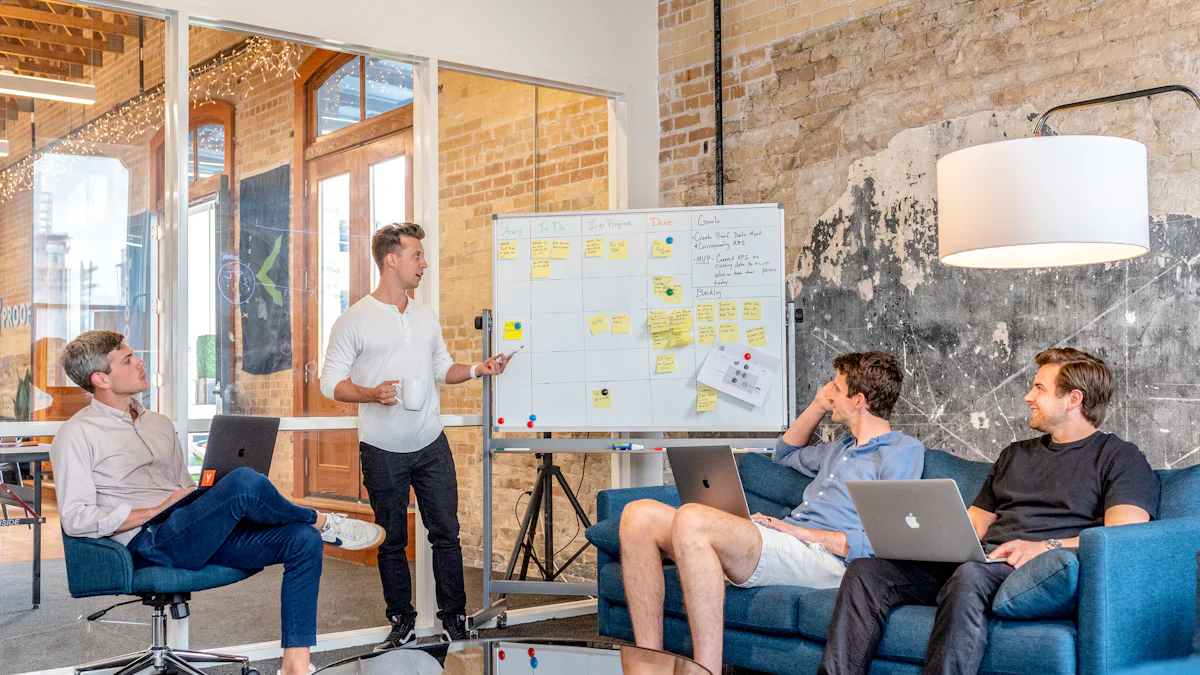Mastering Interview Management for Indonesian Applicants

Mastering interview management is crucial for Indonesian candidates seeking employment. With only 20% of applicants advancing to the interview stage, you must stand out. An applicant tracking system plays a vital role in enhancing this process. It helps streamline scheduling and communication, ensuring a smooth experience. Prioritizing candidate experience is essential. Respecting candidates' time by minimizing wait times and providing timely feedback can significantly improve their perception. For those requiring a visa, efficient interview management becomes even more critical, as it impacts the overall timeline and success of securing employment.
Key Takeaways
Stand out in the competitive job market by mastering interview management, as only 20% of applicants advance to the interview stage.
Utilize an Applicant Tracking System (ATS) to streamline scheduling and communication, enhancing the overall candidate experience.
Respect candidates' time by minimizing wait times and providing timely feedback, which significantly improves their perception of your organization.
Understand cultural nuances in Indonesia to evaluate candidates fairly, recognizing that humility may be prioritized over self-promotion.
Prepare thoroughly for virtual interviews by ensuring reliable technology and a professional setting to create a positive impression.
Gather feedback from both candidates and interviewers to continuously improve the interview process and enhance recruitment strategies.
Implement data-driven changes based on Key Performance Indicators (KPIs) to refine your hiring process and attract top talent.
Key Stages of the Interview Process
Initial Screening
Understanding cultural nuances
When you begin the interview process, understanding cultural nuances is crucial. In Indonesia, cultural values influence how candidates present themselves. You should recognize these differences to evaluate candidates fairly. For example, Indonesian candidates might prioritize humility over self-promotion. This cultural aspect can affect how they respond to questions about their achievements. By being aware of these nuances, you can create a more inclusive and effective interview environment.
Utilizing an Applicant Tracking System for efficient screening
An applicant tracking system (ATS) can significantly enhance the initial screening stage. This system helps you manage resumes and candidate information efficiently. By using an ATS, you can quickly identify qualified candidates based on specific criteria. The system allows you to filter applications, ensuring that only the most suitable candidates proceed to the next stage. This efficiency saves time and resources, making the recruitment process smoother.
Interview Scheduling
Coordinating time zones
Interview scheduling can be challenging, especially when dealing with candidates from different time zones. You must consider the time difference between your location and Indonesia. Coordinating time zones ensures that both parties are available at a convenient time. This consideration shows respect for the candidate's schedule and enhances their experience. By planning carefully, you can avoid scheduling conflicts and ensure a smooth interview process.
Using an Applicant Tracking System for scheduling
An applicant tracking system also aids in interview scheduling. The system allows you to automate scheduling tasks, reducing manual effort. With an ATS, you can send calendar invites and reminders to candidates. This automation ensures that everyone involved is informed and prepared. By leveraging the scheduling features of an ATS, you can streamline the process and focus on conducting effective interviews.
Conducting Interviews
Best practices for virtual interviews
Virtual interviews have become increasingly common. To conduct successful virtual interviews, you should follow best practices. Ensure that your technology is reliable and that you have a quiet, professional setting. Prepare your questions in advance and test your equipment before the interview. These steps help create a positive impression and facilitate a smooth interview experience for both you and the candidate.
Ensuring a fair assessment
Fair assessment is vital during the interview process. You should evaluate candidates based on their skills and qualifications, not personal biases. Use structured interview questions to maintain consistency. This approach ensures that each candidate receives equal treatment. By focusing on objective criteria, you can make informed hiring decisions and promote diversity within your organization.
Pre-Interview Preparation

Effective pre-interview preparation sets the stage for a successful hiring process. By creating a roadmap and coordinating with interviewers, you ensure that every aspect of the interview is well-organized and efficient.
Creating a Roadmap
Defining roles and responsibilities
Start by defining clear roles and responsibilities for everyone involved in the interview process. Assign specific tasks to each team member to avoid confusion. For example, designate one person to handle scheduling and another to manage candidate communication. This clarity ensures that all team members know their duties, leading to a smoother process.
Setting clear objectives
Set clear objectives for each interview. Determine what you aim to learn about the candidate's background and skills. This focus helps you ask relevant questions and assess candidates effectively. By having well-defined goals, you can evaluate whether a candidate aligns with your organization's needs.
Coordinating with Interviewers
Aligning on interview questions
Coordinate with interviewers to align on the questions you will ask. Review sample HR interview questions to ensure consistency and fairness. This alignment helps maintain a structured approach, allowing you to compare candidates objectively. By preparing together, you create a cohesive interview experience.
Briefing on candidate backgrounds
Before the interview, brief interviewers on the candidates' backgrounds. Share relevant information such as work history and skills. This preparation enables interviewers to tailor their questions and focus on key areas. Understanding a candidate's background helps interviewers engage more effectively and make informed decisions.
"Reviewing sample interview questions can guide your preparation," suggests Coursera Staff. This advice emphasizes the importance of being well-prepared for each interview.
Additionally, conducting an employee background check can provide valuable insights into a candidate's history. This step ensures that you have a comprehensive understanding of the candidate, further enhancing the interview process.
Delivering a Great Candidate Experience

Creating a positive candidate experience is essential for attracting top talent, especially in Indonesia. You must focus on effective communication and respect for candidates' time to ensure a smooth interview process.
Effective Communication
Timely updates and feedback
Providing timely updates and feedback is crucial. Candidates appreciate knowing where they stand in the interview process. You should inform them promptly about their application status. This transparency builds trust and keeps candidates engaged. According to a survey, many candidates feel frustrated when they receive no feedback after an interview. By addressing this issue, you enhance the overall candidate experience.
Clear instructions and expectations
Clear instructions and expectations help candidates prepare effectively. You should provide detailed information about the interview format, duration, and any required materials. This clarity reduces anxiety and allows candidates to focus on showcasing their skills. When candidates know what to expect, they can perform at their best, leading to a more accurate assessment of their abilities.
Respecting Candidates' Time
Punctuality in scheduling
Punctuality in scheduling demonstrates respect for candidates' time. You should ensure that interviews start and end as planned. This consideration reflects positively on your organization and shows that you value the candidates' commitment. In Indonesia, where time management is highly regarded, punctuality can significantly impact a candidate's perception of your company.
Minimizing wait times
Minimizing wait times is another way to respect candidates' time. Long waiting periods can lead to frustration and negatively affect the candidate experience. You should streamline the interview process to reduce unnecessary delays. By doing so, you create a more efficient and pleasant experience for candidates, increasing their likelihood of accepting an employment offer.
"Candidates rejected after an interview often cite poor communication and long wait times as major concerns," highlights a recent survey. Addressing these issues can improve your recruitment process and attract better talent.
Feedback and Continuous Improvement
Enhancing your interview process requires gathering feedback and using it for continuous improvement. This approach not only refines your recruitment process but also elevates the candidate experience, especially for those seeking employment in Indonesia.
Gathering Feedback
From candidates
Collecting feedback from candidates is crucial. After each interview, ask them about their experience. This feedback provides insights into what works well and what needs improvement. According to an HR Professional, providing feedback benefits both parties. It helps candidates understand their strengths and areas for improvement, guiding them in future job searches. This practice also serves as a positive public relations opportunity for your organization, especially in the age of social media.
From interviewers
Feedback from interviewers is equally important. Encourage them to share their thoughts on the interview process. This information can highlight any challenges they face, such as difficulties in assessing candidates or issues with the interview format. By addressing these concerns, you can create a more effective and efficient process. Interviewers' insights can also help identify common hiring mistakes in Indonesia, allowing you to refine your approach.
Using KPIs for Improvement
Analyzing interview metrics
Key Performance Indicators (KPIs) play a vital role in data-driven recruitment. Analyze metrics such as time-to-hire, candidate satisfaction scores, and interview-to-offer ratios. These metrics reveal patterns and trends, helping you understand the effectiveness of your recruitment process. For instance, if you notice a high drop-off rate after initial screenings, you might need to adjust your criteria or improve communication with candidates.
Implementing changes based on data
Use the data collected to implement changes. If feedback indicates that candidates experience long wait times, streamline your scheduling process. If interviewers report inconsistencies in assessments, consider revising your interview questions. By making data-driven adjustments, you can enhance the overall process and reduce hiring mistakes in Indonesia. This proactive approach ensures that your recruitment process remains competitive and effective.
"Feedback offers candidates valuable insights into their interview performance," notes an HR Professional. This constructive criticism fosters a more competent and confident workforce, ultimately benefiting your organization.
Incorporating feedback and data into your recruitment strategy not only improves the interview process but also strengthens your organization's reputation. By continuously refining your approach, you ensure a positive experience for all candidates, including those navigating visa and work permit requirements in Indonesia.
Practical Tips for Scheduling and Leveraging an Applicant Tracking System
Streamlining the Scheduling Process
Efficient scheduling is crucial in the recruitment process. You can streamline interview processes by automating reminders and integrating calendars. This approach ensures that both recruiters and candidates remain informed and prepared.
Automating reminders
Automating reminders is a powerful feature of an applicant tracking system. It reduces the risk of missed appointments and keeps everyone on track. By setting up automatic notifications, you ensure that candidates receive timely updates about their interview schedules. This automation not only saves time but also enhances the candidate experience by keeping them engaged and informed.
Integrating calendars
Integrating calendars with your applicant tracking system simplifies the scheduling process. This integration allows you to view and manage all interview appointments in one place. You can easily coordinate with team members and avoid scheduling conflicts. By having a centralized calendar, you maintain order and ensure that interviews run smoothly. This feature is particularly beneficial when dealing with candidates from different time zones, such as those in Indonesia.
Leveraging Applicant Tracking System Features
An applicant tracking system offers various features that enhance the recruitment process. By customizing workflows and tracking candidate progress, you can make smarter hiring decisions and improve talent acquisition.
Customizing workflows
Customizing workflows within an applicant tracking system allows you to tailor the recruitment process to your organization's needs. You can define specific stages for each role and set criteria for advancing candidates. This customization ensures that you focus on attracting the right talent and evaluating them effectively. By creating structured workflows, you maintain consistency and fairness throughout the hiring process.
Tracking candidate progress
Tracking candidate progress is essential for making informed hiring decisions. An applicant tracking system provides a centralized platform where you can monitor each candidate's journey. You can view their application status, interview feedback, and overall performance. This comprehensive overview helps you identify top candidates and make data-driven decisions. By leveraging these features, you enhance your ability to attract and retain the best talent, especially in competitive markets like Indonesia.
Effective interview management is crucial for securing top talent in Indonesia. By utilizing an Applicant Tracking System, you streamline the interview process and enhance efficiency. This system automates scheduling and provides tools for virtual interviews, making it easier to manage candidates. Prioritizing candidate experience is essential. Respect their time and provide clear communication to leave a positive impression. Implementing these strategies ensures a smoother hiring process and improves your organization's reputation in Indonesia's competitive job market.
FAQ
What is an Applicant Tracking System (ATS)?
An Applicant Tracking System (ATS) is a software application that helps you manage the recruitment process. It allows you to track candidates, schedule interviews, and communicate efficiently. By using an ATS, you can streamline your hiring process and improve candidate experience.
How does an ATS help with interview scheduling?
An ATS simplifies interview scheduling by syncing with interviewers' calendars. It allows candidates to choose from available time slots, saving time and effort for everyone involved. This feature is especially useful when coordinating interviews with candidates from different time zones, such as those in Indonesia.
Can an ATS support virtual interviews?
Yes, an ATS can support various virtual interviewing options. It enables live video interviews and pre-recorded video interviews, allowing you to conduct remote interviews. This capability expands your talent pool and makes it easier to interview candidates from Indonesia or other locations.
Why is user interface important in an ATS?
A user-friendly interface is crucial because it enhances the experience for both recruiters and candidates. An intuitive design reduces the learning curve and makes it easier to navigate the system. This simplicity ensures that you can focus on the recruitment process rather than struggling with the software.
How does an ATS improve candidate experience?
An ATS improves candidate experience by automating communication and providing timely updates. It keeps candidates informed about their application status and interview schedules. This transparency builds trust and engagement, making candidates feel valued throughout the process.
What are the benefits of automated reminders in an ATS?
Automated reminders help you avoid missed appointments and keep everyone on track. By setting up automatic notifications, you ensure that candidates receive timely updates about their interviews. This feature saves time and enhances the candidate experience by keeping them engaged and informed.
How can an ATS help with cultural nuances in interviews?
An ATS can store detailed candidate information, allowing you to tailor your approach based on cultural nuances. For example, understanding cultural values in Indonesia can help you evaluate candidates more fairly. By using an ATS, you can create a more inclusive interview environment.
Is it possible to customize workflows in an ATS?
Yes, you can customize workflows within an ATS to suit your organization's needs. You can define specific stages for each role and set criteria for advancing candidates. This customization ensures consistency and fairness throughout the hiring process.
How does tracking candidate progress benefit the recruitment process?
Tracking candidate progress provides a comprehensive overview of each candidate's journey. An ATS allows you to monitor application status, interview feedback, and overall performance. This information helps you make data-driven decisions and identify top candidates.
What should you consider when choosing an ATS?
When choosing an ATS, consider its features, user interface, and integration capabilities. Ensure that it supports virtual interviews and offers automated scheduling. A good ATS should also be easy to use and provide a positive experience for both recruiters and candidates.
See Also
Essential AI Tools for Streamlined Interview Experiences
Unlocking ATS Potential to Discover Exceptional Candidates
Overcoming Language Challenges with Applicant Tracking Systems
From recruiting candidates to onboarding new team members, MokaHR gives your company everything you need to be great at hiring.
Subscribe for more information

